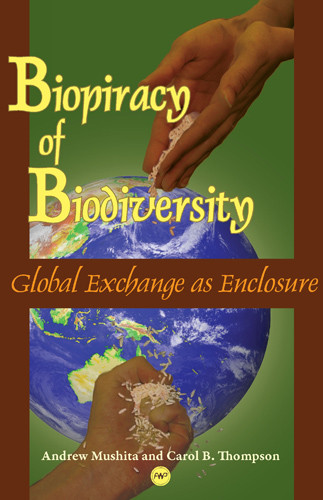Categories
Categories
Authors
Authors
- Home
- Development Studies
- BIOPIRACY OF BIODIVERSITY: Global Exchange as Enclosure, by Andrew Mushita and Carol B. Thompson
BIOPIRACY OF BIODIVERSITY: Global Exchange as Enclosure, by Andrew Mushita and Carol B. Thompson
BIOPIRACY OF BIODIVERSITY: Global Exchange as Enclosure, by Andrew Mushita and Carol B. Thompson
Product Description
Because seeds are a gift to each one of us, they are a gift to all. Ancient cultures increased this wealth by sharing cultivated seed, by giving it away.
Today rich countries and corporations are taking seed and making it private property. They are also destroying seed by polluting fields with genetically modified organisms. Like pirates, they loot the wealth of others.
The struggle for control of biodiversity is passionate: Corporate leaders assume they can make billions; many scientists aspire to manufacturing new species; the promise of new cures tantalizes. But no scientist, no patent lawyer, or economist can depict the whole picture.
This book gives voice to those in Africa who know betterand are willing to help others see the horror of the biopiracy and enclosure behind the camouflage of advancing innovation, land reform, and free trade. Sharing bioresources requires not only different views of science, of law, of trade, but also of community.
The future of the planet depends not so much on military power nor on capital speculation but on each one of us making daily food choices that affect global exchange or private enclosure of biodiversityour collective nourishment, our wealth.
Seeds have been exchanged among cultures for millennia, but suddenly the means of controlling seed trade and genetic transfers have been dramatically altered. This book offers the best means to understand how this issue affects you and every person, present and future, who deserves to know where their food comes from, and through whose hands.
Gary Nabhan
Director, Center for Sustainable Environments, USA
Providing vital information to a cross-section of stakeholders, this book highlights the need for strategic policy alternatives to sustain biodiversity. I recommend it for reading by all those practitioners involved in economic development and food policy issues.
Godwin Y. Mkamanga
Director, SADC Plant Genetic Resources Centre, Zambia
This book is a testimony of how biodiversity is integrated into the African culture of open hands exchanging seeds freely for the benefit of humanity. Although this practice is under threat, Africans continue to offer options for sharing natures heritage. I recommend this book to all those struggling to grasp how different cultures can co-exist and interact to advance socio-economic development that is driven by our collective needs.
Melaku Worede
Founding Director, National Gene-Bank, Ethiopia
ABOUT THE AUTHORS
ANDREW MUSHITA, Director, Community Technology Development Trust, Zimbabwe, has worked for two decades with small-scale farmers throughout Southern African to establish local seed banks and seed trusts. Often representing the region in international forums on biodiversity, he is serving as chairperson of the Regional Agricultural and Environmental Initiatives Network and is a member of the Biotechnology Trust of Zimbabwe.
CAROL B. THOMPSON, Professor of Political Economy, Northern ArizonaUniversity, has published and organized around issues of food sovereignty for three decades; having lived in Southern Africa many years, she has served as a consultant for various international organizations, including the Southern African Development Community and UNICEF.
CATEGORY
Development Studies, Agriculture/AFRICA
 Loading... Please wait...
Loading... Please wait... 


